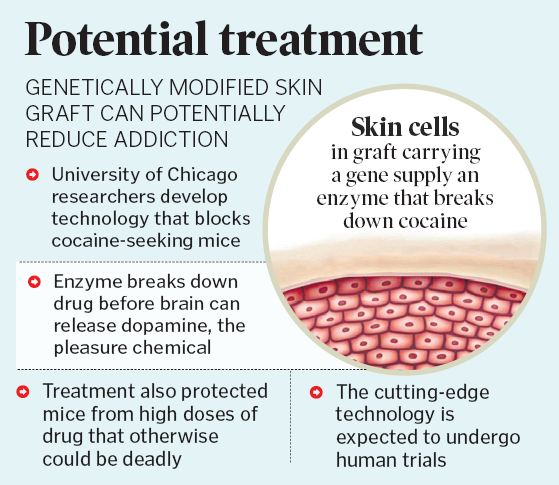UChicago researchers demonstrate that genetically modified skin grafts can provide therapeutic benefits
Post Date – 11:59 PM, Wednesday – 12/21/22

representative image
Hyderabad: Alcohol and other narcotic substance addiction is one of the most challenging diseases. Many times, people who are addicted to these substances find it difficult to quit despite different kinds of treatment and treatment.
As a result of long-term use of such substances, the brain is actually rewired to such an extent that it is difficult to ignore the craving, and treatments often fail. But what if there was a technology that could treat drug addiction with a simple skin graft?
It might sound like science fiction, but a team of researchers at the University of Chicago has demonstrated in an animal model (mice) a new approach in which genetically modified skin grafts can be successfully used to treat addiction, in which One – a potential cure for a disease that has become a global social evil.
Whenever people drink alcohol or take other drugs, levels of dopamine (the pleasure chemical) in the brain rise, creating a feeling of euphoria. As a result, the brain automatically craves this dopamine rush, forcing addicts to drink alcohol or other substances, such as cocaine, again and again in search of the same rush they experienced the first time. Therefore, it is a difficult task for an individual to abstain from substance abuse.

The UChicago researchers’ study of the animal model was published last year in the peer-reviewed journal Nature Biomedical Engineering. In this study, the researchers demonstrated that genetically modified skin grafts could provide therapy and potentially provide long-lasting and effective addiction treatment.
Researchers Xiaoyang Wu and Ming Xu demonstrate that mice that used to drink alcohol or cocaine in a laboratory setting now ignore them after receiving genetically modified skin grafts.
The technology is so promising that researchers recently also sought approval from the US drug regulator, the FDA, to conduct clinical trials in humans to test the use of skin grafts to treat addiction.
In the journal Nature, the researchers state, “Alcohol use disorder (AUD) is one of the most important public health problems. We recently demonstrated that skin grafts generated from mouse epidermal stem cells engineered by CRISPR-mediated genome editing can be transplanted into mice as a gene delivery platform. We show that stem cell-delivered expression of the GLP1 gene reduces alcohol-induced drug use and seeking as well as the development of voluntary oral alcohol consumption”.
In other words, stem cells from addicted patients were harvested and modified using CRISPR by introducing genes. These genes produce molecules that reduce motivation to drink alcohol or other similarly addictive substances. The skin cells are then reimplanted into the patient through a skin graft.
“Skin grafts act as so-called ‘bioengines’ that produce these molecules throughout the life of the graft,” said researchers at the UChicago Center for Innovation Polsky. Drug addiction and drug overdose can be prevented in the model.”
“Using this process, we can efficiently and safely deliver therapeutic drugs to patients. We believe this new approach could serve as a long-term treatment for patients and help protect them from the harmful effects of drug use,” the researchers said.
